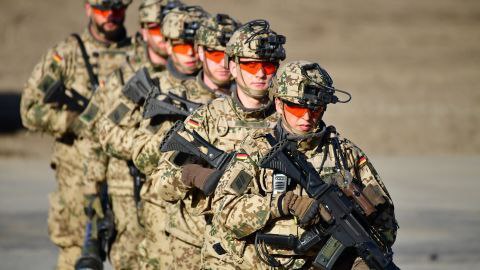Germany Steps Up Rearmament Drive as Europe Braces for Russian Threat

Germany has embarked on its most ambitious military expansion since the Cold War, scrapping all fiscal limits on defense spending under Chancellor Friedrich Merz to counter an escalating threat from Vladimir Putin’s Russia.
The Gaze reports this, referring to The Telegraph.
Under Merz’s sweeping reforms, Germany has removed its constitutional “debt brake” for defense, allowing unlimited borrowing to finance rearmament.
The Bundestag passed the measure earlier this year, opening the door for military spending to soar from €86 billion in 2025 to €162 billion by 2029, equivalent to 3.5% of GDP – far above NATO’s 2% benchmark.
Berlin’s new defense plan allocates €377 billion in additional military spending, on top of the €100 billion special fund introduced by former Chancellor Olaf Scholz after Russia’s full-scale invasion of Ukraine in 2022.
Merz has described the reforms as essential for Europe’s security, warning that “the Americans are largely indifferent to the fate of Europe” amid U.S. retrenchment and Donald Trump’s renewed calls for NATO allies to spend up to 5% of GDP on defense.
The modernization drive aims to reverse years of neglect that once left German soldiers training with broomsticks instead of rifles. Berlin is now investing heavily in modern tanks, air defense, and naval assets to restore the Bundeswehr’s credibility as a key NATO force.
In 2024 alone, Germany ordered 123 Boxer armored vehicles, 265 protected trucks, 19 Skyranger mobile air defense systems, six frigates, two submarines, and up to 1,000 Patriot missiles, many of which will be co-produced in Germany.
Germany is also expanding its fleet with 15 U.S.-made F-35 stealth fighters, 20 additional Typhoon jets, and over 680 Puma infantry vehicles, while replenishing ammunition stockpiles with an €8.5 billion joint order of 155mm shells.
Defense analysts note that the new procurement wave, worth more than three times the combined purchases of Britain, France, and Poland last year, will revitalize Germany’s industrial base. Shares of Rheinmetall, the country’s largest defense firm, have surged more than 1,600% since the start of the war in Ukraine.
Security experts warn that Europe could face a renewed Russian military threat as early as 2027. In response, Berlin is reinforcing NATO’s eastern flank, expanding infrastructure with Poland and Lithuania to ensure rapid troop deployment, and debating the reintroduction of conscription to meet recruitment goals.
The Bundeswehr currently fields around 185,000 active troops, but the government plans to increase this to 260,000 soldiers plus 200,000 reservists. Polls show that more than half of Germans now support a limited form of national service.
As The Gaze reported earlier, President Volodymyr Zelenskyy stated that Ukraine has reinforced its Patriot component within the national air defense system, with support from Germany.